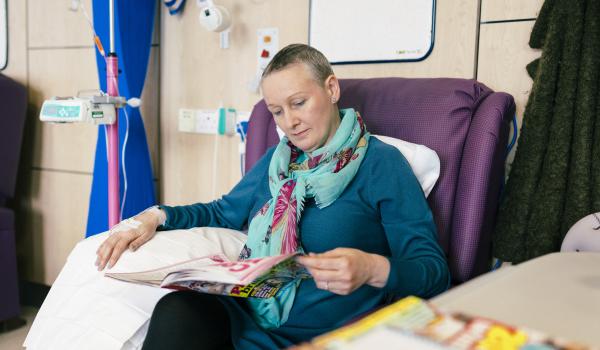Government advice has changed since this article was published in early June 2020. For the most up-to-date shielding advice please see the relevant recommendations for England, Scotland, Wales and Northern Ireland.
Over the past few months everyone in the UK has been asked to make significant changes to our daily lives to reduce our risk of developing and passing on coronavirus (Covid-19). Many women with ovarian cancer have had to go even further than this and ‘shield’ to reduce their risk of catching the virus, because they are at a high risk of getting seriously ill from it. This includes women who are undergoing active chemotherapy and those on drugs that can affect the immune system, such as PARP inhibitors.
If you need to shield, you should have received a letter in late March recommending that you stay at home at all times, except where absolutely necessary (for example going to essential medical appointments). We know that the emotional and practical challenges this has brought - on top of dealing with ovarian cancer - have been incredibly hard for many of you.
Shielding recommendations in England and Wales (but not Scotland or Northern Ireland) have now been loosened. The guidance now suggests that it's acceptable for people who are shielding to go outside for exercise and wellbeing. But with coronavirus still circulating among the wider public, the decision to update the guidelines has raised a lot of questions, with many people shielding asking how safe it is to go outside, and whether they should do so.
Women with ovarian cancer have contacted us with their questions about the changes, and have been discussing this in our Facebook community. Here are some of the questions you’ve asked:
What exactly are the changes to the guidance?
The changes mean that the governments in England and Wales now say people who are shielding can leave the house for exercise and / or wellbeing, as long as you still maintain strict social distancing.
The changes only relate to going outside for exercise and wellbeing. They do not mean that you are encouraged to leave the house for any other reason, such as work or shopping. Any help or support you were receiving, such as food packages, will not be taken away.
The shielding guidelines are recommendations that are designed to help you keep yourself safe, and not laws. You can’t be fined or sanctioned for not following the shielding guidance. This means that it’s up to you to decide whether you stick to the guidelines, and how far. However it’s understandable that these recent changes might mean that you feel pressure to make a decision about whether you can, or should, leave your home, and be anxious about whether this is safe for you.
Does this mean it’s safe to leave my home if I’m shielding?
Everyone is different and we all have different attitudes to risk and what we’re comfortable doing. We’ve been hearing from our community that some women have already been leaving the house, while others have made the choice to stay inside for now. What’s right for one person may not be right for another. So really, it’s down to you to decide what you want to do – but it’s totally natural if this feels like a big decision!
If you’re struggling to make a decision, you might want to have a discussion with your oncologist, clinical nurse specialist or another member of your medical team, who will be able to explain the risks and benefits to you based on your personal circumstances.
The specialist nurses on our support line are also here to talk you through your options. While we can’t tell you what to do, we will be able to help provide the information and support you need to help make the right decision for you.
How is Target Ovarian Cancer representing women with ovarian cancer?
We are committed to making your voice heard as shielding guidance changes. We want to ensure that any future changes to shielding are clearly and directly communicated to you. We also want to see continued support for those who are shielding with practical concerns, mental health, education, work and families.
We have been working hard to influence the organisations involved in these decisions and hold them to account.



